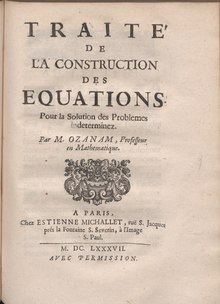| This article includes a list of references, related reading, or external links, but its sources remain unclear because it lacks inline citations. Please help improve this article by introducing more precise citations. (February 2014) (Learn how and when to remove this message) |
| Jacques Ozanam | |
|---|---|
| Born | (1640-06-16)16 June 1640 Sainte-Olive, Ain |
| Died | 3 April 1718(1718-04-03) (aged 77) Paris |
| Nationality | French |
| Occupation | Mathematician |
Jacques Ozanam (16 June 1640, in Sainte-Olive, Ain – 3 April 1718, in Paris) was a French mathematician.
Biography
| This section possibly contains original research. Please improve it by verifying the claims made and adding inline citations. Statements consisting only of original research should be removed. (February 2014) (Learn how and when to remove this message) |
Jacques Ozanam was born in Sainte-Olive, Ain, France.
In 1670, he published trigonometric and logarithmic tables more accurate than the existing ones of Ulacq, Pitiscus, and Briggs. An act of kindness in lending money to two strangers brought him to the attention of M. d'Aguesseau, father of the chancellor, and he secured an invitation to settle in Paris. There he enjoyed prosperity and contentment for many years. He married, had a large family, and derived an ample income from teaching mathematics to private pupils, chiefly foreigners.
His mathematical publications were numerous and well received. Récréations (published 1694) was later translated into English and is well known today. He was elected a member of the Académie des Sciences in 1701. The death of his wife plunged him into deep sorrow, and the loss of his foreign pupils through the War of the Spanish Succession reduced him to poverty. He died in Paris on April 3, 1718 (frequently cited as 1717 because of an error in "éloge de Fontenelle").
Ozanam was honoured more abroad than at home. He was devout, charitable, courageous, and of simple faith. As a young man he had overcome a passion for gambling. He was wont to say that it was for the doctors of the Sorbonne to dispute, for the pope to decide, and for a mathematician to go to heaven in a perpendicular line.
He taught Abraham de Moivre.
Selected works

- Table des sinus, tangentes, et sécantes (1670)
- Methode générale pour tracer des cadrans (1673)
- Geometrie pratique (1684)
- Traité des lignes du premier genre (1687)
- Traité des lieux geometriques (in French). Paris: Estienne Michallet. 1687.
- De l'usage du compas (1688)
- Dictionnaire mathématique (1691)
- Cours de mathématiques (Paris, 1693, 5 vols, tr. into English, London, 1712)
- Traité de la fortification (Paris, 1694)
- Récréations mathématiques et physiques (1694, 2 vols, revised by Montucla in 1778, 4 vols)
- Nouvelle Trigonométrie (1698)
- Méthode facile pour arpenter (1699)
- Nouveaux Éléments d'Algèbre (1702)
- La Géographie et Cosmographie (1711)
- La Perspective (1711).
See also
References
- Bernard Le Bovier de Fontenelle (1790) Eloge de Ozanam, Oeuvres de Fontenelle, Tome 6, p 506, link from Internet Archive.
Sources
Ozanam, Jacques, (1844). Science and Natural Philosophy: Dr. Hutton’s Translation of Montucla’s edition of Ozanam, revised by Edward Riddle, Thomas Tegg, London. Read online- Cornell University
External links
- O'Connor, John J.; Robertson, Edmund F., "Jacques Ozanam", MacTutor History of Mathematics Archive, University of St Andrews
![]() This article incorporates text from a publication now in the public domain: Herbermann, Charles, ed. (1913). "Jacques Ozanam". Catholic Encyclopedia. New York: Robert Appleton Company.
This article incorporates text from a publication now in the public domain: Herbermann, Charles, ed. (1913). "Jacques Ozanam". Catholic Encyclopedia. New York: Robert Appleton Company.